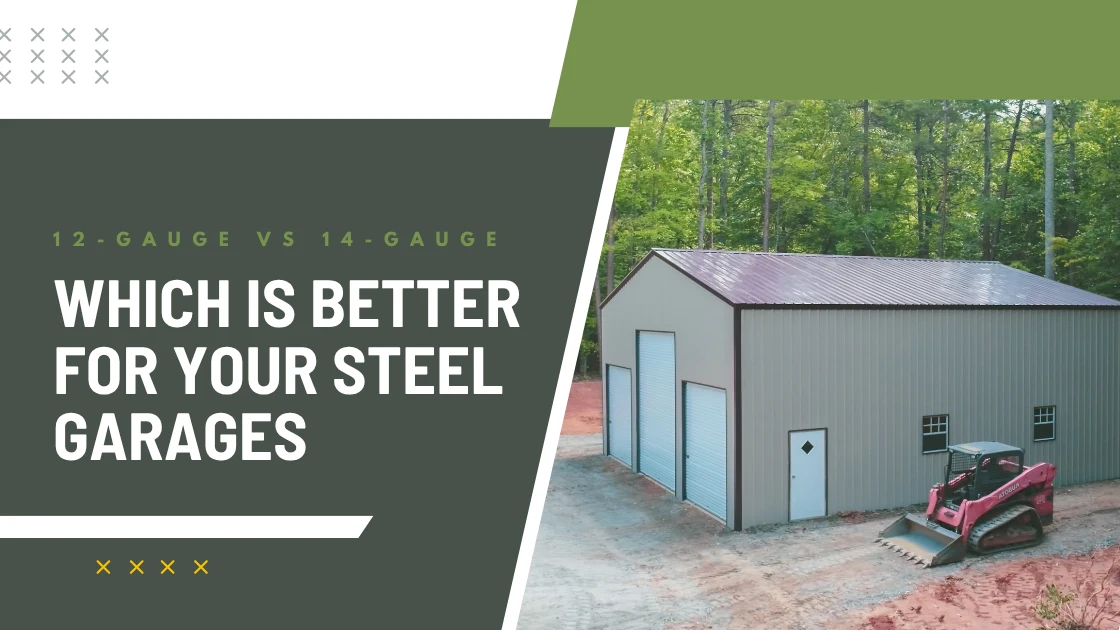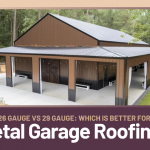12-Gauge vs 14-Gauge: Which Is Better for Your Steel Garages
October 14, 2025
Have you ever thought about why steel is so strong? What’s the science behind it that makes it capable of withstanding storms, holding tons of weight, and even lasting for 50 years in some cases? The secret often lies in something called “gauge”, a measure of steel’s thickness.
When it comes to building garages, two gauges dominate the market: 12-gauge and 14-gauge steel. At first glance, you might miss the difference because the thickness differs by a few inches. If you pick the wrong one, you might face costly repairs down the line because then the structure may face load-bearing and pressure-related issues.
Since you don’t purchase steel garage buildings every day, take your time and decide which gauge is best for your needs, as this decision can stretch your budget. We have compared both options side by side to help you make the smartest choice for your property.
By the end, you will not only know which gauge fits your needs, but you will also understand exactly why.
Also Read: 26 Gauge vs 29 Gauge: Which Is Better For Metal Garage Roofing?
What the Heck Is a Steel Gauge?
When you hear the name “gauge” during the conversation with your metal building dealer, you might get confused and think, “What the heck is this?”. Not knowing terms for a while is fine, but staying unknown always is not. In simple words, “gauge” refers to the thickness of steel frames and panels used in a garage. So, you could also say ‘thickness’ instead of ‘gauge’ when talking to your dealer.
Here are some interesting facts to better understand 14 gauge vs 12 gauge steel for a garage.
- The lower the number, the thicker and stronger the steel.
- The higher the number, the thinner and lighter the steel.
Now you must have understood which is thicker, 12-gauge or 14-gauge steel. So, it was the first thing regarding a prefab garage that buyers must be aware of.
Here’s the actual math behind the steel thickness:
- 12-gauge steel is about 0.1094 inches thick
- 14-gauge steel is about 0.0785 inches thick
That might not sound like a big difference, but in construction, even fractions of an inch matter. This fraction can make a building stronger or weaker.
Real-life example:
Imagine living in Kansas, where tornadoes are common. A garage with 12-gauge framing can handle high winds and debris far better than a 14-gauge one. However, if you live in California with mild weather, a 14-gauge frame may be perfect for your needs.
12-Gauge vs 14-Gauge: A Detailed Comparison
Is the thickness the only thing that helps to understand 12 vs 14 gauge steel? No, the list of things is long enough to compare them and know how they differ and how their difference affect the overall strength of the structure.
1. Thickness
As you read it above, thickness is the core difference. When you look at both steel frames, you might not notice that one is thicker than the other because the difference is of few inches. The 12-gauge steel frame is about 0.1094 inches thick, whereas the 14-gauge steel is around 0.0785 inches thick.
Why do metal frames’ and panels’ thickness matter? It’s because thicker steel means more strength and resistance against bending, dents, or collapse. In some regions of the USA, 12-gauge is widely used for vertical steel garages because people want strong buildings.
2. Price
Differences in the steel gauge impact the price of a steel garage. If your budget is tight, a 14-gauge steel garage is an economical option. Go for a 12-gauge if price is not the concern to buy a steel building.
- 12-gauge: It costs more because it requires more steel to manufacture.
- 14-gauge: It is the most cost-effective option, making it the most common choice.
Example: A 20×20 garage in 14-gauge might cost $1,500 less than in 12-gauge. For someone on a budget, that’s a big difference.
3. Strength
The lifespan of a prefab garage building also depends on the thickness of its steel components. Some structures stand firm and bear the wind pressure for 20 years, while some could bear it for more than 40 years. The proper steel gauge provides the desired strength, extending the garage’s life beyond standard years.
- 12-gauge: Built for extreme weather zones, heavy snow loads, and high winds.
- 14-gauge: Strong enough for regular weather but not recommended for hurricane or snow-prone areas.
Real-life example:
Farmers in Colorado prefer 12-gauge because snow can pile up on the roof for weeks. In contrast, homeowners in Texas often go with 14-gauge because winters are mild.
4. Warranty Coverage
Warranty coverage is a critical factor that differs, along with the thickness of the steel. Well, warranties can differ, but a general understanding can help you decide on the right steel frames.
- Many dealers offer longer warranties, ranging from 20 to 25 years, for 12-gauge metal garage framing.
- 14-gauge warranties are typically shorter because a garage made with this type of steel is more likely to collapse than a garage made with 12-gauge steel.
Example: In Florida, most counties require garages to withstand winds of 150 mph or more. So, you will likely need a 12 gauge steel thickness for approval.
6. Weight-Bearing Capacity
This type of capacity is crucial for the safety and durability of a pre-engineered steel garage. The lower the number, the stronger the space. But the lower the number, means higher the price also. Well, if you are not planning to store anything heavy, a 14-gauge metal garage can be the best choice.
- 12-gauge: Handles more load on the roof (snow, equipment, solar panels).
- 14-gauge: Lower load capacity, prone to damage from heavy snow and large items.
7. Installation Flexibility
Often, you need a custom car garage immediately because your vehicles are facing environmental issues or are cramped in a tight space. In this case, which type of steel frames can fit the needs quickly?
- 12-gauge: It needs more skilled installation, takes more time, but gives a stronger frame.
- 14-gauge: The frames are lighter, easy to transport and assemble, and quicker to install.
8. Lifespan
A few inches in a steel frame can make the difference of several years! It’s not an exaggeration. A 12-gauge metal building is much stronger than a 14-gauge metal building. Many homeowners opt for a thicker side when they want a residential-style garage, as they want to invest in a garage that will last a lifetime.
- 12-gauge: This metal frame can last 40-50 years with proper care.
- 14-gauge: Garage made with this frame typically lasts 25-30 years.
9. Insurance & Resale Value
When you invest in a garage, it’s not just about storage; it’s also about protecting your money in the long run. Insurance companies and future buyers look closely at the strength of your building, and that’s where the gauge of your steel can quietly make a big difference.
- 12-gauge: May qualify for lower insurance rates and adds more value if you ever sell your property.
- 14-gauge: Standard insurance coverage; it doesn’t significantly boost resale value.
10. Applications
Not every steel garage is built for the same purpose. Some are installed to withstand storms and house heavy machinery, while others are installed to protect a family car. That’s why choosing between 12-gauge and 14-gauge steel really comes down to how you plan to use your garage.
- 12-gauge: Best for commercial garages, workshops, agricultural buildings, and storm-prone areas.
- 14-gauge: Great for residential garages, carports, or storage units in calm climates.
A Table to Compare 12-Gauge vs 14-Gauge Quickly
So, there are several key points to consider when understanding 12 vs 14 gauge steel. We created a small and handy table for you so you don’t feel overwhelmed while comparing both gauges.
| Feature | 12-Gauge Steel | 14-Gauge Steel |
| Thickness | 0.1094 inches | 0.0785 inches |
| Price | Higher | Lower |
| Strength | Extremely Strong | Strong but Lighter |
| Warranty | Up to 25 Years | Up to 10-15 Years |
| Weather Resistance | Excellent for Storms | Best for mild climates |
| Lifespan | 40-50 years | 25-30 years |
| Installation | Heavier, need professionals | Easier, DIY-friendly |
| Insurance | May lower premiums | Standard |
| Best Use | Commercial and farms. For harsh climates | Homes and storage. For calm climates |
| Resale Value | Higher | Standard |
When to Choose 12-Gauge Steel Frame?
You have learned the differences and compared 12-gauge steel with 14-gauge steel. There were several distinguishing features between the two types of prefab garages. Here is when you can choose a 12-gauge metal frame.
- You live in an area with heavy snow or hurricanes.
- You want your garage to last decades with minimal issues.
- You plan to store valuable vehicles or equipment.
- You want better insurance benefits and resale value.
When to Choose a 14-Gauge Steel Frame?
Not every garage needs to withstand hurricanes or last a lifetime without a scratch. If your priorities are not extreme durability, heavy-duty strength, or extra insurance perks, a 14-gauge steel frame might be your perfect fit.
Choose 14-gauge when:
- You live in a mild climate with little snow or wind.
- You are on a tight budget and want a functional garage.
- You only need it for basic storage or residential use.
- You want something that’s quick to install.
Your Strong Garage Needs a Reliable Partner
At the end of the day, both 12-gauge and 14-gauge frames have their place. The smarter choice depends on your climate, budget, and needs. However, consulting with a reliable metal building dealer will make it even easier because they are experts. Viking Metal Garages is a renowned name for installing high-quality metal garages. Our experts help you decide the correct gauge, customize your garage, and ensure it’s installed with precision. Explore our website, where you can find various sizes and designs of steel buildings.

